
Teacher aides are now expected to undertake a range of tasks including explicit instruction, skills development, basic planning and creating resource.
Studying a teacher aide course in Queensland has never been easier. Queensland has 1250 schools including 920 primary schools, each one representing numerous opportunities for well-trained, qualified teacher aides with the right demeanour, attitude, and skills.
ITAC’s teacher aide courses are based on research from around the world – only with ITAC will you learn best practice skills, strategies and techniques that will set you apart as a high performing teacher aide in any of Queensland’s 1250 schools.
Study the CHC30221 Certificate III in School Based Education Support to learn the basics of working as a teacher aide in Queensland. The CHC40221 Certificate IV in School Based Education Support will teach you how to work with children with special needs including those with complex needs requiring ongoing support.
The Teacher Aide Combo is our most popular program and comes highly recommended – combining the best of both nationally recognised courses to improve your skills, knowledge, confidence, self-esteem, and job prospects. ITAC is the only provider in Australia offering a true 'combo' course.
ITAC is the only provider in Australia offering a true 'combo' course.
Below we discuss many questions and topics about studying and working as a teacher aide in Queensland. To learn more about an individual course such as costs, duration and current government funding opportunities, please follow the relevant link below:
If you're thinking about enrolling in a teacher aide course, read our article on how to choose a training provider by clicking here.
1. What advice do you have for anyone thinking about enrolling in a teacher aide course in Queensland? 2. Can I study a teacher aide course online from anywhere in Queensland? 3. How long does it take the average person to complete a teacher aide course? 4. Why do schools want staff who hold a research-based qualification? 5. How can I compare teacher aide course providers in QLD? 6. What are the main differences between each teacher aide course in Queensland? 7. Where can I read more about teacher aide courses in Queensland? 8. How do I become a teacher aide in Queensland? 9. How hard is it to find a job as a teacher aide in Queensland? 10. How much do teacher aides in Queensland earn? 11. Is there anything else I need to know about studying a teacher aide course in Queensland? 12. Are teacher aides also known as teacher’s assistants in QLD? 13. Should I enrol in a teacher aide course with ITAC or a TAFE? 14. What's it really like to study a teacher aide course in Queensland? 15. What are the key points from this article? Final thoughts

Teacher aides are now expected to undertake a range of tasks including explicit instruction, skills development, basic planning and creating resource.
We recommend enrolling in an integrated course - this means a course where all units are mashed together thereby removing the duplication of content across units. ITAC is the only provider in Australia offering an integrated teacher aide course.
For those on the go, here is what you need to know in 60 seconds or less:

Learn best practice strategies such as implementing small-group activities as pictured above – only in ITAC’s research-based teacher aide courses.

Online mode is popular with adult learners. No longer does family, work or income need to be sacrificed in order to gain an education - study when it's convenient to you.
You can study the CHC30221 Certificate III in School Based Education Support and the CHC40221 Certificate IV in School Based Education Support online in Queensland and in all areas. Online can mean various things however, depending on the provider, so it is important to ask questions to find out about the types of resources you will be provided with and how much support the provider is actually going to offer you.
As far as support is concerned (what your fees pay for), choose a provider who visits you while you are undertaking your work placement and who employs qualified schoolteachers - they know the industry better than anyone.
For example, our students listen to pre-recorded webinars and classroom lectures – often while taking the dog for a walk, catching the train or sitting on a plane.
Studying an online course no longer mean staring at a computer screen for months on end. While studying online does mean using the internet, there are a range of other activities that you will do offline. For example, our students listen to pre-recorded webinars and classroom lectures – often while taking the dog for a walk, catching the train or sitting on a plane. Students can also attend our regularly scheduled catch-up webinars.
All courses are planned to take 26 weeks to complete, however as our courses are self-paced students usually manage to finish much sooner. It really depends on:
Think of it like this - how long does it take to bake a cake? How long does it take to walk a dog? All of these things can really depend on the person and their circumstances. It can also depend on the topic as well. If you have worked in mining, construction or another industry with an emphasis on ‘work health and safety’ then you’ll find that particular topic in your course to be quite easy.
In general, if you have worked with (or raised) children in the past, or have been employed in similar industries such as aged care or childcare, you should move through any of ITAC's courses at a very reasonable pace without too much trouble.
We often use the term ‘research-based’ and ‘best practice’ to describe our courses. So, what exactly does this mean? In simple terms, when we develop our courses, our expert trainers (all former teachers) comb through the research from Australia and around the world to find what works. We look at what teachers are taught in universities, the skills that governments want their teachers to have and what the research says about teacher aides and their effectiveness. Here are just two examples that have informed our course content in some way:

The teacher aide pictured is implementing a series of teaching and learning strategies such as those that you will only learn at ITAC.
Practically speaking, this means that we base our teacher aide courses around a range of practical strategies, skills and techniques that are used by high performing teachers, teacher aides, schools and governments around the world - including Australia. In fact, ITAC students learn many of the same strategies that teachers learn during their university studies. Depending on your course, you will learn some of the following with ITAC:
You will only find these and many other teaching strategies in one of ITAC’s research-based, best practice teacher aide courses. While most providers teach a few strategies, at ITAC you will learn dozens, if not hundreds of practical and effective strategies and techniques making you an expert in your new profession.
In fact, ITAC students learn many of the same strategies that teachers learn during their university studies.
Where else will you study, learn and master these skills? Nowhere but ITAC! We use the principles of adult learning, combined with high quality expert support, and in-house developed materials, to bring you a world-class teacher aide course that is second to none.
A quick note – the list above only covers a small percentage of the total skills, strategies and techniques that you will study in your teacher aide course with ITAC – we didn’t mention other topics such as behaviour management, disabilities, disorders, additional needs, operational and logistical tasks and many other essential aspects. Whether you study the CHC30221 Certificate III in School Based Education Support or the CHC40221 Certificate IV in School Based Education Support, learning and mastering a range of best practice skills is vital for your future career and your students’ success.
Whether you enrol with ITAC or not, it's important to choose a provider that is high quality, who teaches best practice strategies and skills, who represents value for money and finally, who has experience and expertise. Here is how you could go about doing this:
Enrol with a provider that runs classes even if you don’t attend them. Why? Classes are a good indication that the provider has quality trainers and materials.
We regularly get asked about the difference between the government funded CHC30221 Certificate III in School Based Education Support and the CHC40221 Certificate IV in School Based Education Support. Here is a side by side comparison to make it easier to see the difference. Note that to make this table simple, we have made some broad generalisations.
Teacher Aide Courses in Queensland
Code |
CHC30221 |
CHC40221 |
| Level | Certificate III | Certificate IV |
| Full title | Certificate III in School Based Education Support | Certificate IV in School Based Education Support |
| Units | 15 | 17 |
| Nationally recognised | Yes | Yes |
| RPL | Available | Available |
| Online mode | Yes, all of QLD | Yes, all of QLD |
| Modules | 3 main modules | 4 main modules |
| Skill level | Basic - intermediate | Intermediate - advanced |
| Duration | 600 hours for someone with no experience with children or previous study | 600 hours for someone with no experience with children or previous study |
| Payment plan (FFS) | Yes | Yes |
| Placement | 100 hours | 100 hours |
| Placement location | Usually mainstream | Usually with special needs |
| Job outcome | Mainstream teacher aide | Special needs teacher assistant |
| Job location | Mainstream classroom | Mainstream or special needs |
| Kindergarten | Yes | Yes |
| Pre-primary | Yes | Yes |
| Primary | Yes | Yes |
| High school | Sometimes | Yes |
| Senior school | Sometimes | Yes |
| Special need’s school | No | Yes |
| Disability school | No | Yes |
| Specialist program | No | Yes |
| Job prospects | Medium (depending on quality of training) | High (depending on quality of training) |
| Job stability | Medium (if studied best practice skills) | Extremely high (if studied best practice skills) |
| Independence | Low to medium | Medium to high (assuming enrolled in a high quality course) |
| Key role | General learning support | Support students with special needs |
| Teaching strategies | Scaffolding, modelling, one-on-one instruction, play based learning, others | All CHC3013 + metacognitive skills, levels of instruction, explicit instruction, cooperative learning |
| Behaviour techniques | Basic such as scanning and proximity | Basic and more advanced such as motivational strategies |
| Knowledge | Broad knowledge of teaching strategies, behaviour management, operational tasks, policies | Knowledge of basic strategies and some advanced strategies related to working with disabilities and disorders |
| Graduate outcome | Employ basic skills to effectively work as a teacher aide in the mainstream classroom environment under teacher direction. | Effectively work with students with a range of learning and behavioural needs including students with disabilities and disorders - particularly autism, ADHD and intellectual disability. |
As you can see from the comparison above, there are more similarities than differences particularly in terms of structure, cost, and modes. Both the CHC40221 Certificate IV in School Based Education Support and the CHC30221 Certificate III in School Based Education Support have a similar number of units and modules.
The CHC40221 Certificate IV in School Based Education Support specifically targets the skills and knowledge required to work with students with disabilities and disorders such as autism and ADHD. The CHC30221 Certificate III in School Based Education Support on the other hand, is aimed at teaching students the basic and introductory skills to work with students in mainstream classrooms under the close guidance of the registered classroom teacher.
Taking the leap and enrolling in a teacher aide course such as the CHC30221 Certificate III in School Based Education Support or the CHC40221 Certificate IV in School Based Education Support is not a decision to be taken lightly. We have published detailed articles answering many of your common questions regarding studying and working as a teacher aide in Queensland.
Teacher aide courses in WA – additional information
| Clickable link | What you’ll learn |
| How to become a teacher aide in Australia | The most efficient and effective method for becoming a teacher aide and landing your ideal job in a WA school. |
| What do teacher aides do? | Description of the roles and responsibilities of teacher aides in Western Australian schools. |
| Teacher Aide Certificates and Qualifications | We outline various ways that you can gain a qualification, such as the CHC30221 Certificate III in School Based Education Support, and improve your professional capabilities. |
| How much do teacher aides get paid? | Your hourly, weekly and annual pay/salary in WA as well as related questions such as holiday pay. |
| Teacher's Aide Course Online: Is it Right for me? | Studying a teacher aide course online: what to expect, how it works, questions to ask, is it right for you? |
| How to choose a training provider | Learning how to compare and select a training provider with our detailed guide. |
| Integrated course structure | Studying a course that is designed with an integrated structure removes the duplication found across units. This means a huge time-saving compared to a unit-by-unit course. |
The most common path to becoming a teacher aide in Queensland is to complete a nationally recognised qualification with a reputable provider. The two main courses to become a teacher aide in Queensland is the CHC30221 Certificate III in School Based Education Support and the CHC40221 Certificate IV in School Based Education Support. Both are government funded for those who are eligible. See our website for further details.
In the past it was not necessary to complete a qualification and many teacher aides did not hold a certificate of any kind (there were no accredited courses anyway). These days, almost all schools require that their support staff hold an education support qualification. Schools need to know that all of their staff provide maximum value for money and are well trained in key areas such as:
Once you have enrolled and completed (or nearly completed) your nationally recognised qualification, you can begin looking for work as a teacher aide in your local community. We recommend putting your name down at 20 or more schools where you are willing to work. The more schools you are willing to work at, the higher your chances of finding work and the sooner you are likely to be hired. Most graduates eventually manage to find work within a reasonable and comfortable travel distance from their home. However, if you are narrowing down your search to less than 5 schools, you may be limiting your chances of success.
It is important to organise your clearances and to prepare a professional resume. We have a resume builder and introductory letter template on our website - it's free, easy to use and no sign-up required.
A quick hint: Most hiring managers only scan resumes - they rarely read them thoroughly. Ensure that your qualification and the name of the provider is in bold so they easily see it.
The most common path to becoming a teacher aide in Queensland is to complete a nationally recognised qualification with a reputable provider.
For obvious reasons, we can’t promise that every person who wants to become a teacher aide will find a job as a teacher aide. Most graduates tend to find work in their local area following the completion of their course (assuming of course they enrolled in a reputable course and learnt all the necessary best practice strategies that schools require).
A good place to start your job-hunting journey is at the Brisbane’s Catholic Education Office or the Department of Education’s Smart Jobs and Careers website. Both sites regularly advertise vacancies.
Many students who enter our training programs have an idea of where they would like to work, although, by the time they finish their course, they are more open to different types of schools. The more you are open to trying schools outside of your comfort zone, the easier it will be to find work as a teacher aide.
In general, we find that most students do not struggle to find work provided that they have a suitable demeanour to work in schools and enjoy working with people and children. As we have discussed earlier, it really depends on your search parameters as well. If you are only willing to work at one school, then your chances of finding work in the near future is somewhat limited (you are basically waiting for someone to retire or quit). If you try a whole bunch of schools, you then might end up knocking back multiple offers.
We have found that it's common for our students to find work by applying for casual work in a number of schools. Many prefer relief (also known as supply work) because of the flexibility that it provides, not to mention the 25% loading.
Finding work may also depends on whether you have completed a qualification from a reputable provider and the quality of the training provided. Schools like to know that you have completed your course with a reputable provider so they can be confident in your abilities. Our advice: Do not skimp on investing in your own education.
You should also think about where you would prefer to ultimately work. Part of this decision will be led by your experiences so far but also your personal preferences and personality – some people work well with younger students, others older students.
You could also narrow your search by first selecting one or more categories from the list below. If that doesn't work out, you may want to widen your criteria.
| School type | Examples |
| Primary schools | |
| Secondary schools | |
| Combined P-10 or P-12 | |
| Special schools | |
| Hospital schools |
The majority of teacher aides in Queensland earn approximately $32 or more per hour. The exact pay will range from $23 to $34 depending on the position, location and other factors. Some teacher aides work in mainstream classes with students who have special needs and are therefore paid a higher salary than those who do not work with special needs. This is due to the fact that working with special needs requires a higher level of training, expertise, responsibility and knowledge of a range of complex disabilities, strategies, processes and policies. It also requires the CHC40221 Certificate IV in School Based Education Support.
The highest paid teacher aides are those who work in special needs centres or special need’s schools – often also called education support centres or special schools.
There are a range of positions and specialist roles filled by teacher aides in Australian schools. The pay for these roles varies depending on factors such as:
Broadly speaking, many new teacher aides earn $30 per hour and work approximately 32.5 hours per week (over five days). The average teacher aide in Queensland is therefore earning around $1000 per week, give or take.
We have already discussed various aspects of the work placement and the fact that the 100-hours is completed in a local registered school. During your work placement you will complete a range of activities such as assisting the teacher and supporting students in the lead up to your workplace assessment. In this assessment, your trainer will visit you in the school. He or she will observe you completing a range of tasks such as helping students with reading and writing (and implementing best practice teaching and learning strategies).
Another aspect of your course is the theory assessments. The theory assessments are comprised of short answer questions, mini projects, case studies and other activities of that nature. There are no essays or long reports to stress about. You certainly don’t need to be a professional writer to enrol and complete the CHC30221 Certificate III in School Based Education Support or the CHC40221 Certificate IV in School Based Education Support. Many people are apprehensive before they enrol and imagine writing dozens of essays and reports – this simply is not the case (at least with ITAC).
If you skipped straight to this section, the three teacher aide courses we offer in Queensland are below. Note the Teacher Aide Combo is not currently funded but might still be a good option if you want two qualifications on your resume.
Note that while all of our teacher aide courses are nationally recognised, no two providers are the same and nor do they use the same materials. So, while you could enrol in the CHC30221 Certificate III in School Based Education Support or the CHC40221 Certificate IV in School Based Education Support with any number of different providers, the title of the course is where the similarities end.
Teacher’s assistants and teacher aides are two terms that mean the same thing. Other terms are commonly used depending on your location such as:

Teacher aides are also known as teacher’s assistants. Regardless of the role or title, all teacher aides complete the same nationally recognised teacher aide courses such as the CHC30221 Certificate III in School Based Education Support.
If you have travelled overseas such as in the US, you may have heard of terms such as paraprofessional and paraeducator. All these terms are effectively the same thing, sometimes with slight differences. 'Teacher aide' is the common phrase used by the general public and by most countries around the world.
You have two options. The first option is to enrol in a teacher aide course in Queensland with a private provider such as ITAC. As a private provider, we specialise in delivering nationally recognised teacher aide courses to adult learners. Here at ITAC, the average age of our students is 37. Our trainers case manage students who need flexible yet supportive study programs – students study when they can, around other commitments such as work, family and health.
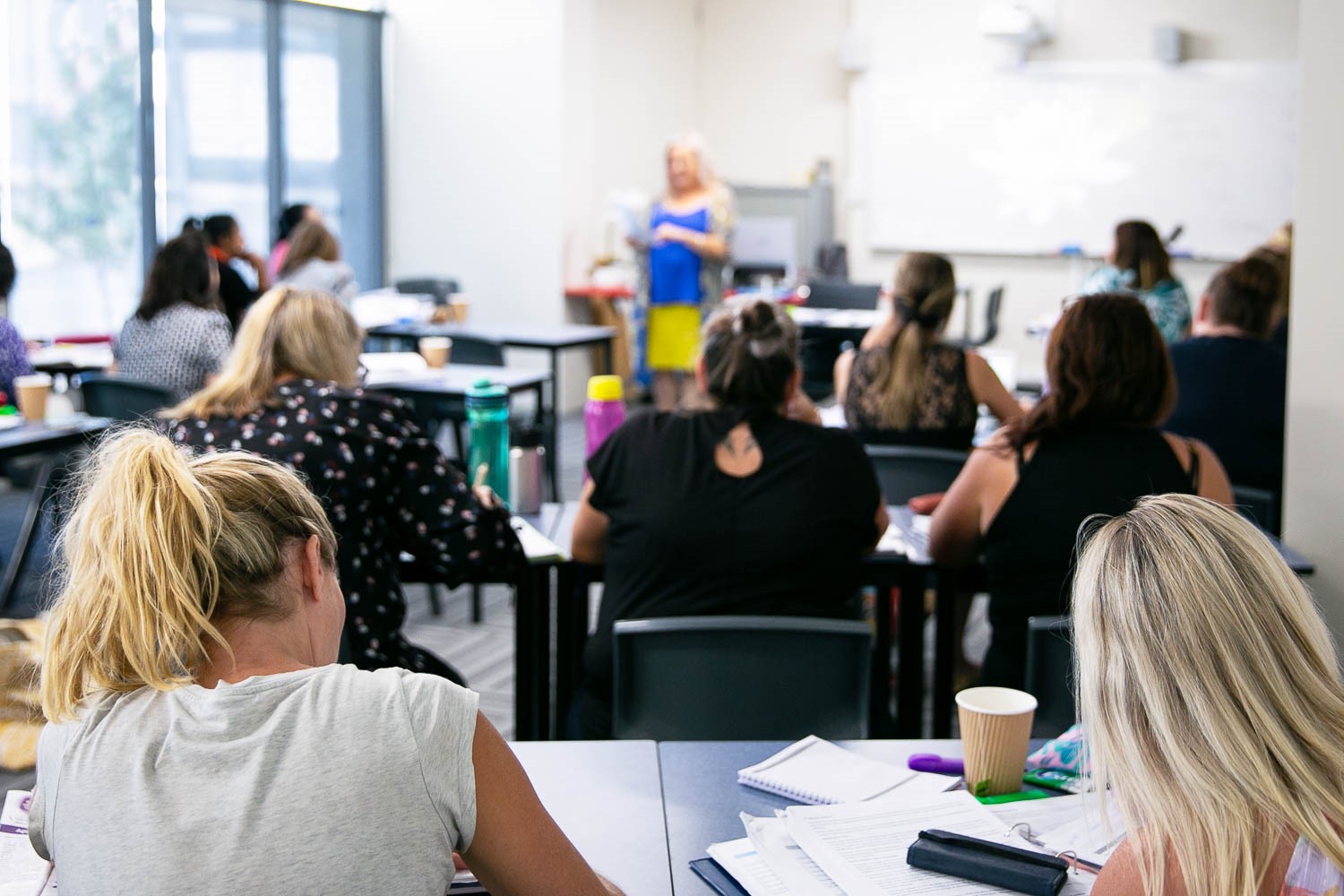
ITAC students tend to be adult learners. TAFE tends to focus on high school students/leavers. ITAC class pictured.
The TAFE system on the other hand is generally geared towards students who are younger or who live in regional and rural areas. Many students who are currently in high school or have recently graduated enrol in TAFE so they can be in class several days per week (TAFE in this way is really an extension of high school). If you think being in class 3-4 days per week for up to a year is for you - TAFE might be your best option.

Above: Study a research-based teacher aide course in Queensland with ITAC and learn industry best practice teaching and learning strategies such as play-based learning, modelling, co-operative learning, pre and post reading strategies, feedback techniques, learning styles, guided learning, rapport building, using cues, active reading and many others.

Above: Best practice skills such as one-on-one instruction, worked examples and scaffolding are essential for all teacher aides. At ITAC, you will study a range of effective techniques and strategies including cognitive load theory, social stories, motivational strategies, and many more skills that will make you an invaluable and essential member of your school community! Ensure you learn best practice skills by enrolling in a reputable teacher aide course with ITAC.

Above: Teacher aides who have completed a teaching aide course with a reputable provider and studied best practice skills are often given additional responsibilities such as managing small group learning and even developing and facilitating ongoing programs. The teacher aide in the picture above is implementing a range of strategies including questioning skills, feedback skills, metacognitive skills, the levels of instruction and cooperative learning. You too could do this by enrolling with the leader in teacher aide courses – ITAC.

Above: A group of students sit on the floor to engage in a learning activity provided by their teacher aide. In our best practice teacher aide courses in Queensland, you will study skills such as those shown above: consolidation, review activities, pair and group work, scaffolding, developing resources, designing basic activities and resources, and many more.
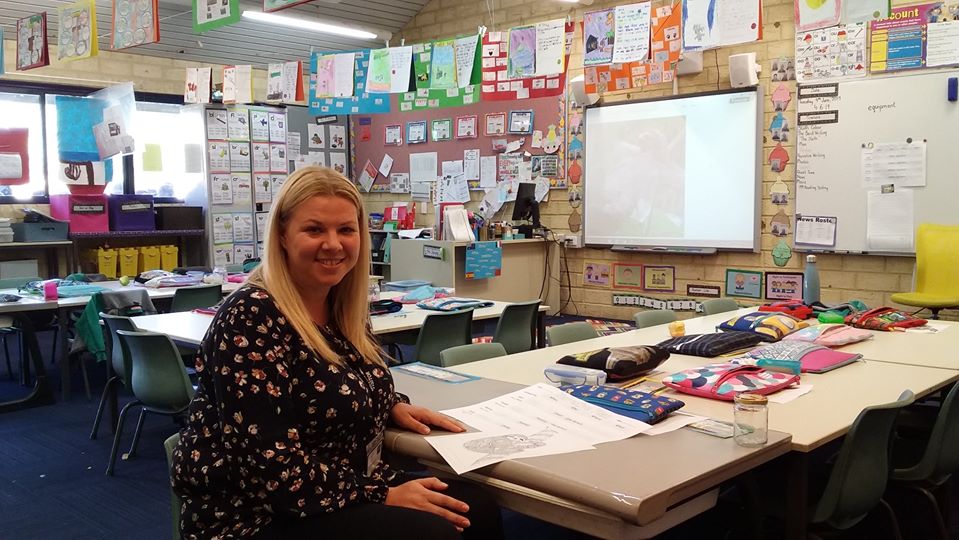
Above: Could this be you? An ITAC student on placement for the CHC30221 Certificate III in School Based Education Support demonstrating a series of best practice strategies and techniques such as active reading, writing strategies, building on existing knowledge, anchor activities and mental scripting. Study best practice teaching and learning strategies by enrolling in one of ITAC’s research-based teacher aide courses.
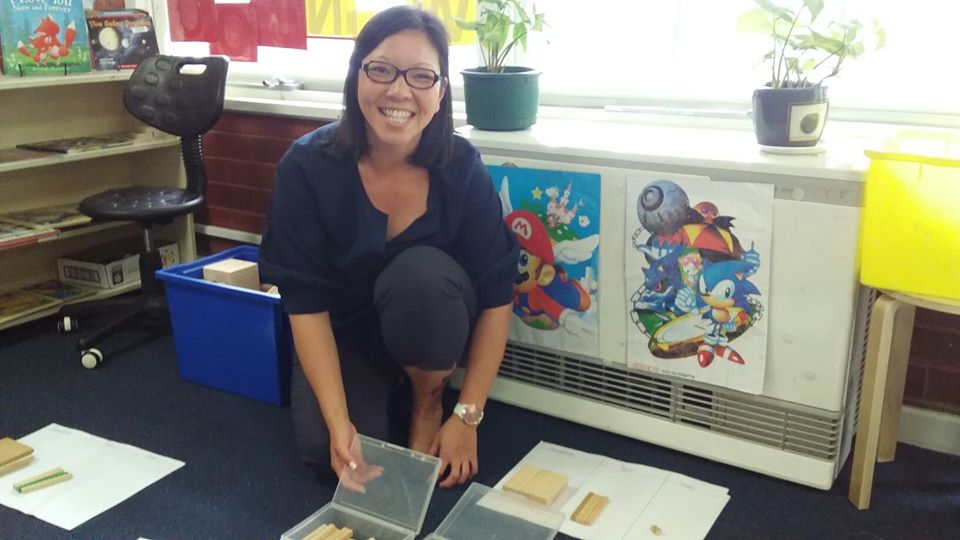
Above: An ITAC student on her placement who is planning, organising and facilitating a numeracy activity to address the identified learning needs. You too could do this by completing a nationally recognised teacher aide course with ITAC.
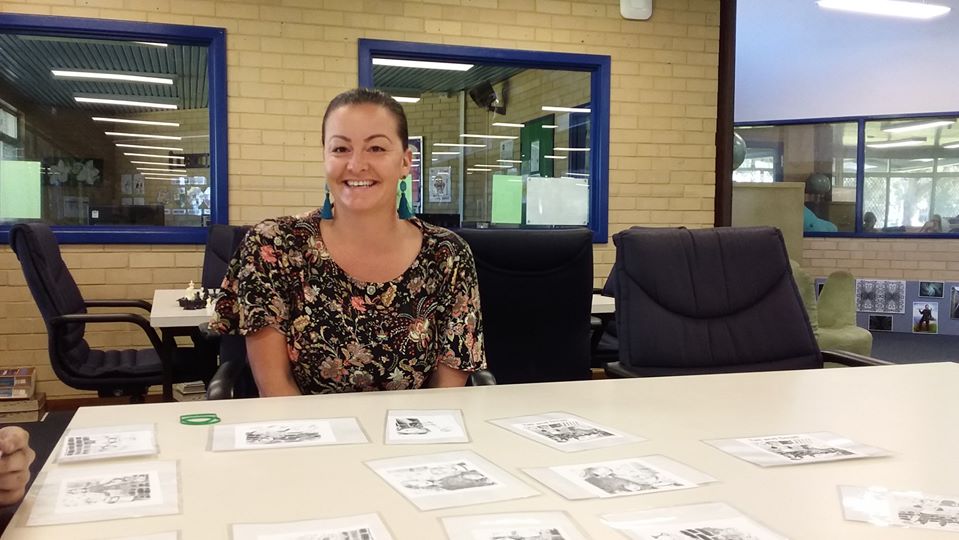
Above: ITAC students learn a range of best practice strategies particularly for use in literacy and language lessons. This includes critical literacy, multi-modal strategies, multiple exposures, writing to learn, self-questioning, pre-reading activities, and many others. Learn best practice skills and strategies and boost your career as a teacher aide in Queensland with ITAC.
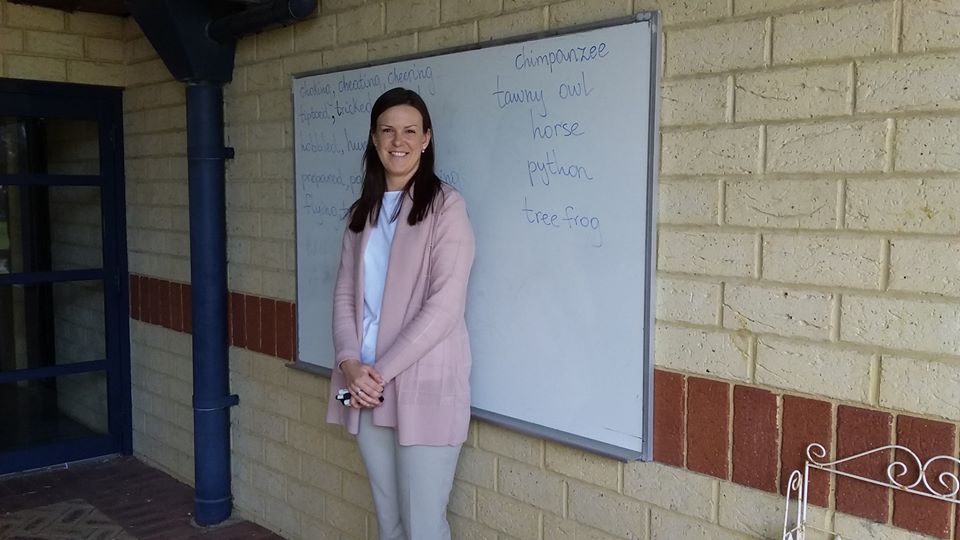
Above: An ITAC student who recently completed her 100-hour placement for the CHC40221 Certificate IV in School Based Education Support. As you can see from the board, she has been implementing best practice strategies such as worked examples, repeated reading, spelling, and writing techniques, and a range of other traditional and non-traditional strategies. Could you do this?
Always enrol with a provider who uses an integrated structure as this saves considerable time.
So far you have discovered some of the opportunities in Queensland for those looking for a new and exciting career as a teacher aide or teacher assistant. But first, a few challenges lay in your way – where to study? What to study? etc. We have tried to allay some fears and answer these questions as well as many of the common enquiries we receive each and every day – pay, courses, modes, support, difficulty etc. If your questions remain unanswered, please don’t hesitate to contact Queensland's leading provider of teacher aide courses - ITAC.
Happy training!